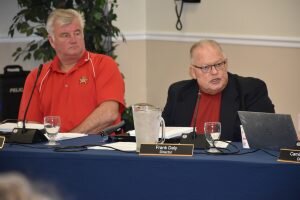(Jan. 9, 2020) After concerns arose over accepting proposed revisions to the OPA Architectural Review Committee guidelines, the board of directors on Saturday voted 5-2, with members Tom Janasek and Larry Perrone opposed, to spend two weeks reviewing the amended language before seeking legal review.
ARC committee board liaison Steve Tuttle initially made a motion to accept the architectural guideline changes during the directors meeting on Jan. 4 after noting the current language was originally written in 2006 and last updated in Feb. 2010.
Tuttle said the intent was to clarify areas of confusion within the association rules.
Janasek took issue with some of the proposed changes, beginning with fire pit restrictions.
“There’s so many fire pits in Ocean Pines right now, there’s no way you’re going to keep up with them,” he said.
Fencing requirements was another problem Janasek raised.
“We’ve all had issues with fencing in Ocean Pines for the last 30 years,” he said.
The third issue concerned trailers.
“Ocean Pines is a completely different community than it was 10 years ago [or] 20 years ago,” he said. “You’ve got families that run their own business.”
While not endorsing allowing unrestricted parking for commercial trailers in driveways, Janasek did suggest that some middle ground solution would be appropriate.
“There are circumstances where someone … that might be working the next day [has] a trailer in their driveway and they don’t need to get a CPI violation notice,” he said. “They shouldn’t be there for the whole weekend, because obviously that’s a different story, but I just think these are too restrictive.”
While appreciative of the yearlong process ARC committee members undertook to draft the proposed revisions, Janasek said the document needs further tweaks.
“I don’t like the guidelines,” he said. “I’d be happy to sit on the committee and talk about how we can revise them.”
Board member Camilla Rogers, who also serves as liaison to the OPA Bylaws and Resolutions Committee, also raised some concerns.
“I think we have a duty to notify the people who are residents of Ocean Pines,” she said.
Rogers said the discussion of the proposed changes at the bylaws meeting a day earlier included the subject of political sign placement.
While the association can regulate placement of OPA candidate signs in homeowner’s yards, the same is not true for federal, state or local political contests.
“We can’t regulate others and that needs to be clarified,” she said. “We certainly can’t stifle … someone’s first amendment rights.”
Board member Dr. Colette Horn said she was concerned that the revisions suffered from a lack of precise language.
“There needs to be greater consistency in the use of terminology,” she said.
In addition to the political sign issue, Horn said she was troubled by the vehicle restrictions.
“We have had challenges to the vehicle section,” she said. “There needs to be greater clarity of the definitions of the terms within that section.”
Board member

Director Frank Daly asks if proposed revisions to the OPA Architectural Review Committee guidelines should undergo review by legal counsel, which followed a wealth of concerns from board member Tom Janasek during the groups meeting on Jan. 08
asked if a review by legal counsel would be in order.
“From the work I’ve done on enforcing declarations, these things are extremely complicated,” he said.
Regardless of the intent behind the restrictions, drafting legally plausible language is crucial, Daly said.
“The way that I would say it as a layman and the way you would say it to fit with our bylaws and resolutions in a legal sense, it’s an entirely different document,” he said. “It just has to be different to hold up if it’s challenged.”
Returning to the issue of political signs, Tuttle said the proposed guideline updates does include a clear definition delineating association elections from other contests.
“Political signs are a freedom of speech issue and we cannot restrict those the same we can OPA election signs,” he said.
Tuttle also expressed frustration with some of the concerns mentioned.
“All of these documents were presented to you well over a month ago for comment,” he said. “I’m a little frustrated that no one has sent me a single question … and now we have these questions coming up.”
Tuttle also said he had consulted with Parks regarding the need for a legal review but decided it was unnecessary at that time.
“ARC is an independent committee and it’s not controlled by the board,” he said. “I think that’s important to keep in mind.”
Daly said although a legal review of the document would be costly, it could be deemed appropriate after further advisory committee review.
“Let’s take people at face value that we’ll face legal challenges to these documents,” he said.
Perrone also championed the merits of legal review.
“It’s critical that it does go to counsel,” he said. “What we’re seeing as we try to enforce these regulations is that we’re getting challenged by different people.”
Daly said in practice many people employ the threat of legal action when not satisfied with outcomes.
“The fact of the matter is we’re in a society where litigation is often considered the first resort if you don’t like the answer that you hear,” he said.
Daly said the board is charged with protecting the best interests of the association as well as property owners.
“Unfortunately, the expense comes with the turf,” he said.
In the end Tuttle agreed to amend his motion to allow board members until Jan. 24 to review the revisions and provide a summarized version for subsequent review by local counsel.
